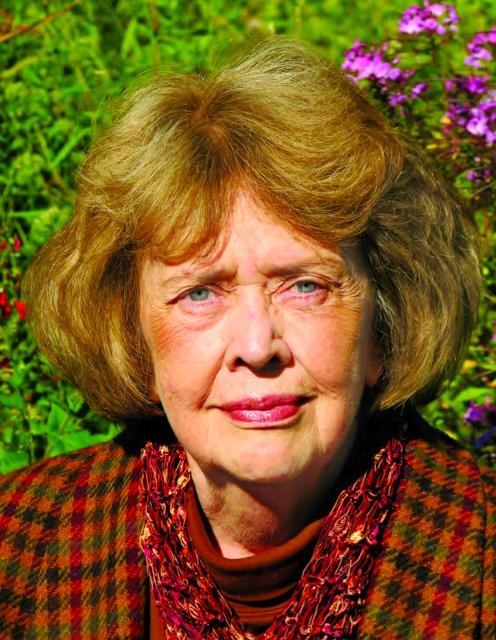“It has the feel of a town where you can write something,” author Gail Godwin says of Asheville. It’s the town where she grew up, and it often appears in her writing (she calls it Mountain City in fiction). And while it’s not named as such, there are hints of Asheville in Godwin’s new novel, Flora.
“If I have to go back to the first seed of this story, it was the memory of a house that my mother and her new husband and I lived in during the summer of 1948,” says Godwin. They rented a floor of 1000 Sunset Drive; the house has since been torn down, but the author says she never got over that house. During that summer, there was a polio epidemic in Asheville, so Godwin, then 11, was not allowed to leave the mountain. She spent her time with two young boys who lived in the same dilapidated three-story house — for entertainment, they would phone the Grove Pharmacy and order a supply of candy and comic books, which would be delivered by a man on a motorbike.
Flora (Godwin’s 14th novel) is set, similarly, at “Old One Thousand,” a gracefully crumbling residence that once housed recovering tubercular and mental patients of means. In 1945, it’s inhabited only by 10-year-old Helen and her father, who is absent either due to work or drink. Helen lost her mother when she was 3, and her grandmother and mentor Nonie just passed away. So, Helen’s father invites Flora, the naive younger cousin of Helen’s late mother, to take care of Helen while he’s gone to his summer job at Oak Ridge, Tenn.
Oak Ridge, part of the Manhattan Project, where the atomic bomb was developed, has been the subject of other authors with local ties: The Girls of Atomic City by Denise Kiernan, and Sawdust and Incense by Gale D. Webbe. Webbe was the Parish priest at St. Mary’s in Asheville and spent two summers working at the Tennessee facility; his memoir was published by Godwin’s imprint.
Adding to the drama of Flora, when two children in town contract polio, Helen’s father (Like Godwin’s family) sequesters her and her caretaker in Old One Thousand. Their only visitors are the housekeeper, the preacher and a delivery driver called Finn.
Godwin says that she set her book in ’45 rather than ’48, “so I could bring in other bombs beside childhood bombs.” The bombs she means are the ones that the Oak Ridge workers were helping build, unknowingly, that were subsequently dropped on Japan. That event highlights a chain of unfortunate occurrences in Flora, but the lives of the novel’s characters are already underscored by a creeping dark. Helen is called, at one point, “a haunted child” — haunted not just by the deaths she’s experienced, but by the stories of “the recoverers” who once inhabited Old One Thousand (rooms in the house are still named for the infirm), and for the voice of her upright but snobbish grandmother, which guides her.
Helen’s voice — animated and snarkily humorous — is more prematurely-adult than spooky. She tells her tale from the point of view of an almost-11-year-old, but Godwin makes smart use of postdiction and multi-faceted perspectives. “That developed as I wrote it,” says the author. “I had given myself the option of presenting the scenes through the child’s eyes, through her adult eyes and also how her grandmother would have seen it, which is a skewed vision.” Adult Helen, we learn, becomes a writer, and as such, reframes certain events, perhaps to tie up loose ends.
Mostly, in the moment of that long and difficult summer, Helen regales the reader with her acerbic observances. “His feet in his civilian shoes were small and dainty, like a dancing master’s,” Helen notes when Finn comes to dinner. “How sad that all of us had gone to so much trouble and none of us looked as good as we usually did.”
Compelled by strong characters, social and familial tumult and innocence catapulting to its brutal demise, Flora fascinates right up to its taut conclusion.
Godwin will read from the novel this week at Malaprop’s, a homecoming that seems especially sweet. “I love Malaprop’s,” she says. “I left Asheville after college and lived abroad, but my mother was there. She would alert me to these new developments in the area. I remember when she said, ‘These two young women have come and they’ve opened a bookstore. I think that’s so plucky of them.’” Godwin’s mother was a reporter for the Asheville Citizen-Times during World War II and took Godwin, as a child, to buy her first set of colored pencils at the stationery store once housed in the original Malaprop’s location.
Flora is also the selection for Xpress’ Local Matters Book Club, which will meet to discuss the novel on Monday, June 3.
— Alli Marshall can be reached at amarshall@mountainx.com.
who: Gail Godwin, reading and signing for Flora
where: Malaprop’s
when: Sunday, May 19 (7 p.m., free. https://www.malaprops.com)
Local Matters Book Club meets in the Malaprop’s Cafe on Monday, June 3 at 7 p.m. to discuss Flora.




Before you comment
The comments section is here to provide a platform for civil dialogue on the issues we face together as a local community. Xpress is committed to offering this platform for all voices, but when the tone of the discussion gets nasty or strays off topic, we believe many people choose not to participate. Xpress editors are determined to moderate comments to ensure a constructive interchange is maintained. All comments judged not to be in keeping with the spirit of civil discourse will be removed and repeat violators will be banned. See here for our terms of service. Thank you for being part of this effort to promote respectful discussion.